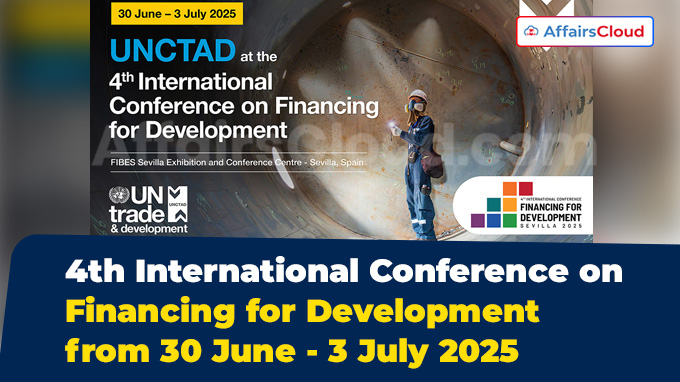 The 4th International Conference on Financing for Development (FfD4) was held from June 30 to July 03, 2025 in Sevilla, Spain. The 4-day long conference brought together more than 15,000 participants, including 50 Heads of State and Government.
The 4th International Conference on Financing for Development (FfD4) was held from June 30 to July 03, 2025 in Sevilla, Spain. The 4-day long conference brought together more than 15,000 participants, including 50 Heads of State and Government.
- The conference is organised once every 10 years by New York City(the United States of America, USA) based United Nations Department of Economic and Social Affairs (UN-DESA).
- Union Minister Nirmala Sitharaman, Ministry of Finance (MoF) and Ministry of Corporate Affairs (MoCA), Government of India(GoI), led the Indian delegation from the Department of Economic Affairs (DEA), MoF, at FfD4.
About 4th International Conference on Financing for Development (FfD4):
i.The conference focused on tackling new and emerging challenges, emphasized the urgent need for full implementation of the SDGs, and reviewed progress on earlier global commitments including the Monterrey Consensus (2002), the Doha Declaration (2008), and the Addis Ababa Action Agenda (2015).
ii.The conference featured over 470 side and special events, alongside flagship events such as the International Business Forum (IBF), Sustainable Development Goal (SDG) Investment Fair, and key announcements were made under the Sevilla Platform for Action (SPA).
Key Highlights of FfD4:
India at FfD4 & IBF:
Union Minister Nirmala Sitharaman addressed the 3rd plenary session at FfD4, she underscored that India supports reforms to the international financial architecture to improve inclusivity and equity, including Multilateral Development Banks (MDB) reforms and fairer credit rating system.
i.She further highlighted the role of Global Sovereign Debt Roundtable, launched during India’s Group-20 Presidency (G20), aimed at accelerating debt transparency and promoting consistency in restructuring processes.
ii.She also addressed the IBF Leadership Summit titled ‘From FFD4 Outcome to Implementation: Unlocking the Potential of Private Capital for Sustainable Development’, where she made a strong pitch for mobilizing private capital for sustainable development.
iii.She highlighted that GoI has taken significant measures to overcome certain financial challenges like: establishing independent regulators, implementing transparent bidding processes, standardizing contracts, and enhancing the Ease of Doing Business (EoDB).
- She further highlighted India’s transformation in the RE sector, expanding from just 2.8 Giga Watt (GW) of solar energy installed in 2014 to over 100 GW in 2025
iv.On the sidelines of FfD4 summit, Union Minister Nirmala Sitharaman held bilateral meetings with senior ministers from Germany, Peru, and New Zealand, and President of European Investment Bank (EIB).
Gender Equality Goals Face USD 420 billion Funding Gap, Warned UN Women:
At FfD4, UN agency UN Women cited the United Nations Conference on Trade and Development (UNCTAD)’s report titled ‘The Costs of achieving the SDGs: Gender equality Related to SDGs’ which highlighted that developing countries are falling short by an estimated USD 420 billion annually in the funding required to achieve gender equality under SDGs.
- UN Women has urged the governments and financial institutions to address the chronic underfunding and systemic financial barriers.
i.As per UN Women, only one in four countries have systems in place to track how public funds are allocated to gender equality, which obstructs efforts to plan and deliver national development goals.
- Critical sectors such as healthcare, education, and employment programs for women and girls are persistently underfunded, particularly in developing nations.
ii.During FfD4, UN Women laid out key recommendations to drive progress for women and girls and towards the 2030 Agenda for Sustainable Development commitments.
EU-IFAD Launched EUR 4.26 Million ‘Resilient Remit’ Initiative:
A new transformative EUR 4.26 Million ‘Resilient Remit’ initiative was officially launched at FfD4. This newly launched project is co-funded by the European Union (EU) and implemented by Rome (Italy) based UN specialized agency, International Fund for Agricultural Development (IFAD).
- This new initiative aims to reduce remittance transfer cost and enhance financial literacy and digital inclusion, particularly for women and youth.
About Resilient Remit initiative:
i.The initiative will support rural families of countries like: Honduras, Senegal and Pakistan to adapt to climate change and bolster their resilience to weather shocks.
ii.It also aims to facilitate the use migrant remittances and diaspora investments into climate resilience strategies for rural communities, by enhancing access to critical financial services: savings, credit, insurance, and customized investment products.
iii.The initiative will enhance the development impact of remittances, the largest source of external finance for Low-and-Middle-Income Countries (LMICs).
iv.It will promote digital literacy and inclusion, with special focus on women and youth within migrant communities to enhance their capacity to manage remittances and climate-related risks.
v.With the inclusion of digital financial ecosystems, the initiative aligns with the UN SDGs, especially the target of reducing remittance transaction costs to 3% by 2030.
- As per IFAD, achieving this target could save migrant families up to USD 18 billion every year.
Points to Note:
- Remittance flows to LMICs reached USD 685 billion alone in 2024.
- So far, IFAD has supported more than 75 remittance-related projects in over 50 countries.
8 Countries Launched ‘Aviation Solidarity Coalition’ on Premium Flyers:
At the FfD4 conference, eight countries, France, Kenya, Barbados, Spain, Somalia, Benin, Sierra Leone, and Antigua & Barbuda, launched the ‘Aviation Solidarity Coalition,’ aimed at imposing taxes on premium air travel, covering first-class and business-class tickets as well as private jet flights.
- The proposal is part of the SPA, which seeks to promote green taxation and international solidarity through more progressive and harmonized tax systems.
About Aviation Solidarity Coalition:
i.The European Commission(EC) and the Global Solidarity Levies Task Force, established in 2023, will provide technical assistance to implement these measures under the Pact for Prosperity, People, and the Planet (4P).
ii.The coalition aims to work towards Conference of Parties (COP30) which is scheduled to be held in Belem, Brazil, on a better contribution of the aviation sector to fair transitions and resilience, with a special focus on premium flyers.
iii.It also aims to enhance domestic revenue mobilization of developing countries and support international solidarity particularly related to climate change mitigation and adaptation.
iv.By COP30, the Global Solidarity Levies Task Force aims to provide the emergence of a ‘coalition of the willing’ to implement one or more its proposed levies.
Note: As per the coalition, just 1% of the world’s population is responsible for over 50% of the Carbon Dioxide (CO2) emissions from commercial aviation.
- Meanwhile, premium travel witnessed a sharp increase in recent years with a 46% increase in emissions from private aviation between 2019-2023.
New Borrowers’ Forum Unveiled to Help Debt-distressed Nations:
FfD4 unveiled a new borrowers’ Forum, which is supported by the United Nations (UN) and is designed to assist debt-distressed nations.
- The forum will provide a platform for countries to share knowledge and experiences of best practices, provide assistance and improve the effective of their representation and voice in international forums.
About Borrowers’ Forum:
i.This new forum is one of the 11 recommendations proposed by the UN Secretary-General’s Expert Group on Debt, appointed by the UN-Secretary General Antonio Guterres in December 2024.
- The group was mandated to identify pragmatic and actionable solutions to the debt morass for the Seville conference.
ii.It will enable countries to receive technical and legal advice, promote responsible lending and borrowing standards, and build collective negotiating strength.
iii.The launch of this new forum holds great significance as 3.4 billion people live in countries that spend more on interest payments than on critical social services such as health and education in 2024.
UNDP Unveiled ‘Sevilla Platform’:
During the FfD4, United Nations Development Programme (UNDP) introduced the Sevilla Platform for Action (SPA), a strategic coalition representing over 130 initiatives aimed at accelerating the implementation of the ‘Compromiso de Sevilla’ outcome document
- These initiatives will help the countries to take lead in their own development by integrating their National Development Plans (NDPs) and biodiversity goals and climate strategies i.e. Nationally Determined Contributions (NDCs) with actionable strategies laid out by the Integrated National Financing Frameworks (INFFs), and to deliver their nationally-identified priority through country platforms.
- Between 2022 and 2024, UNDP-led efforts helped unlock USD 870 billion in SDG-aligned investments. UNDP now aims to mobilize USD 1 trillion by 2025.
Note: INFFs were introduced in the Addis Ababa Action Agenda of 2015 as a key mechanism to support countries in mobilizing and aligning financing for sustainable development.
FfD4 Concluded with Sevilla Commitment:
On July 03 2025, FfD4 concluded successfully in Sevilla, Spain, with the launch of 130 initiatives under SPA which in turn started the implementation of Sevilla Commitment or Compromiso de Sevilla.
- These initiatives were focused on advancing private and public private investment for Sustainable Development, including measures to bolster tax systems and domestic resource mobilization.
About Sevilla Commitment:
i.Sevilla Commitment was adopted unanimously during the conference. It lays out a roadmap to close the USD 4 trillion annual SDG financing gap in developing countries.
ii.It is the 1st inter-governmentally agreed financing for development framework since 2015.
iii.It outlines a path on 3 fronts: Catalyzing investment at scale for sustainable development, addressing the debt and development crisis, and reforming international financial architecture.
Other Key initiatives:
i.A Debt Swaps for Development Hub: This initiative is led by Spain and the United States of America (USA) based World Bank (WB), aimed to strengthen capacity and improve collaboration to scale up debt swaps and lower debt service burdens.
ii.A Debt-for-Development Swap Programme: It is initiated by Italy, aimed to convert EUR 230 million of debt obligations of African countries into investments in development projects.
iii.A Debt ‘Pause Clause’ Alliance: It is a coalition of 4 countries namely, Canada, France, Spain and the United Kingdom (UK) and various MDBs including, American Development Bank, Luxembourg based EIB, Abidjan (Cote d’Ivoire) based African Development Group (AfDB), Manila (the Philippines) based Asian Development Bank (ADB), among others.
- They pledge to including ‘pauses clauses’ in their lending, to suspend debt service payments during crises.
iv.A Sevilla Forum on Debt: It aims to help countries learn from one another and coordinate their approaches in debt management and restructuring, with one of the UN specialised agency will serve as its secretariat, with support from Spain.
v.A blended finance platform, SCALED: It is led by a coalition of countries: Germany, Canada, France, UK Denmark and South Africa and financial institutions such as: Allianz, Zurich Insurance Group, among others.
- It aims to support efforts to develop effective and replicable, scalable blended finance instruments and funds with development impact.
vi.FX Edge: It is a new MDB toolbox for FX-risk management instruments, led by the Inter-American Development Bank, and Delta, a liquidity platform by London (the UK) based European Bank for Reconstruction and Development (EBRD) to help develop finance institutions offer local currency lending.
vii.An Effective Taxation of High-Net-Worth Individuals (HNWIs)is jointly led by Brazil and Spain, aims to ensure HNWIs pay their fair share.
viii.A coalition led by the UK and the Bridgetown initiative, aims to scale-up pre-arranged financing from 2% to 20% of total disaster financing by 2035.
About Spain:
President– Pedro Sánchez
Capital– Madrid
Currency– Euro (EUR)




